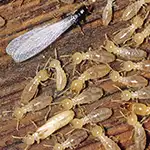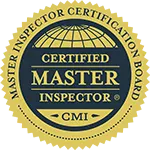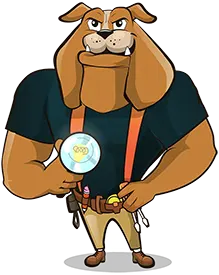Table of Contents
Termites and other wood destroying insects can wreak havoc on your home.
Our experienced termite inspection checks your home inside and out for signs of infestation. Mud tubes, hollow wood, discarded wings, cracked paint, or sagging floors—we find it all during our termite inspection.
Regular termite inspections do more than just protect your home; they can also save you money. Many insurance companies offer discounts on homeowners’ policies when you have regular a termite inspection. Proving that your home is termite-free or properly treated, you may qualify for lower premiums.
For reliable and thorough termite inspection services in Kansas City, trust Bulldog. We’re dedicated to professionalism and putting our customers first, ensuring your home remains secure and termite-free. Contact us today to schedule your home inspection + free termite inspection today.
Subterranean Termite Inspection
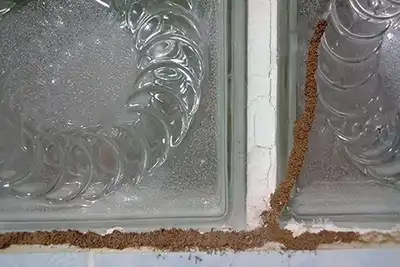
Inspecting For Termites
Termites are found top-to-bottom inside and outside a home.
Carry a flashlight and long screwdriver to tap or poke soft wood.
This is what you’re looking for:
- Shelter tubes (long mud trails filled with termites) coming up from the ground along the exterior of the home
- Discarded wings outside your home
- Mud tubes or damaged wood along the floor and walls of your garage
- Mud tubes and damaged wood at the sill plate, rim joist, and floor joists around your crawlspace or basement
- Mud tubes causing paint to bubble and peel
How to Keep Them Away
- Don’t store wood on the ground
- Create a 1″- 2″ gap between any siding and the soil
- Keep crawlspace vents open to minimize moisture and humidity
- Divert water away from your foundation.
- Seal foundation cracks and gaps
- Keep vines, bushes, and flowers trimmed away from siding
Damage And Risks
Subterranean termites are considered the most damaging of all termite species and cause a big chunk of the nearly $5B in property damage insects cause each year.
A typical colony can have between 60,000 and 2,000,000 termites and a small colony can eat 2 to 3 feet of 2×4 per year.
Their damage is NOT normally covered by homeowner’s insurance.
What to Do If You Have Them
Buy an anteater (just kidding).
Call a professional pest control company. There’s nothing you can do to stop them since their nest is underground.
The most comprehensive treatment is a combination of both chemicals (to stop them) and bait traps (to keep them away).
The typical cost is $500-$2000 depending on the size of the colony and the type of treatment you choose.
Carpenter Ant Inspection
They will usually build nests in dead tree stumps, old firewood, and rotten fence posts.
They get inside homes by crawling through bushes, holes, and foundation cracks; and along power lines and tree limbs.
Inside, you’ll find piles of frass (looks like sawdust mixed with insect parts) sitting in front of small holes in walls, doors, and windows as they ruin the hidden wooden parts of your home.
If you think you have an infestation, play it safe and call a professional pest control company. Treatment for carpenter ants is different from termites so a professional can tell you what you’re up against and help you create a plan to remove them.
Carpenter Bees Inspection
This least common culprit is also the least destructive but no less annoying because they look like bumblebees.
What They Look Like
Hairy top and smooth bottom. That’s the easiest way to tell the difference between them and a bumblebee.
Females have a stinger, but males don’t.
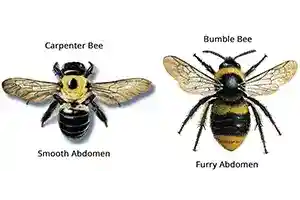
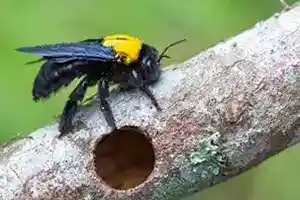
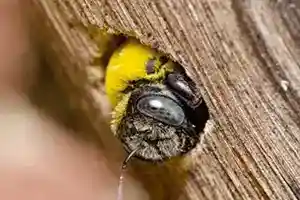
Inspecting For Carpenter Bees
You’ll see them buzzing around your home. These are not social insects so there won’t be a hive, just a single solitary bee trying to get by.
They also create smooth, round holes the size of a dime in siding, trim, wood posts, fences, and tree branches.
To add insult to injury, Carpenter bee larvae are a food source for woodpeckers.
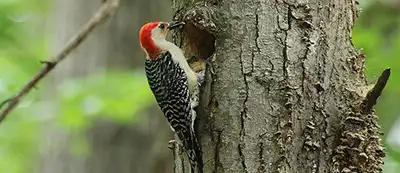
Damage And Risks
They make holes in wood (the average depth is 6” long but some can as long as 10 feet), which is never good. If ignored or undiscovered this can cause structural damage to the wood over time.
Females have stingers but only sting when threatened. Males are territorial and will try to buzz you away, but without stingers they can’t hurt you.
What Can You Do If You Have Them?
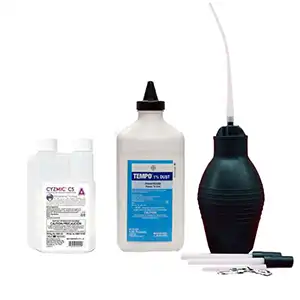
- There’s insecticide there’s no need to call a pest control company in a panic. Just treat the hole, don’t seal it, and let the formula do its thing (better yet, follow the directions on the label). After awhile you can seal the hole.
- If you continue seeing them or they keep coming back, call a pro. They’ll help you get rid of them.
- Paint or stain exposed wood. Carpenter bees have been known to avoid treated or painted wood.
- Last, seal open cracks with silicone-based caulking so they don’t have a place to hide.
30 Min. DIY Home Inspection Checklist – Only $18.99
Check the Bones YOURSELF While You Tour the Home.
This straightforward field guide is based on our Major-Items Inspection and focuses ONLY on the bones. It shows you:
- WHERE to look
- WHAT to look for
- WHAT it means
All in the time it takes to tour the home.
Let us help you decide if the home has good bones or is just a money pit in disguise – BEFORE you make an offer and BEFORE you order your home inspection.

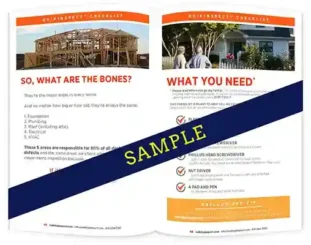
Created by a Certified Master Inspector™
13 Pages Fully Illustrated
Immediate PDF delivery + flipbook
Save time and hundreds – sometimes thousands – in wasted home inspection fees.
All in about 30 minutes
Use it over and over
Find out for yourself if there are major issues hiding in plain sight BEFORE the home inspection.
Frequently Asked Questions
Yes.
I’ve been inspecting for wood-destroying insects in Kansas City since 2003. This includes termites, carpenter ants, and carpenter bees.

